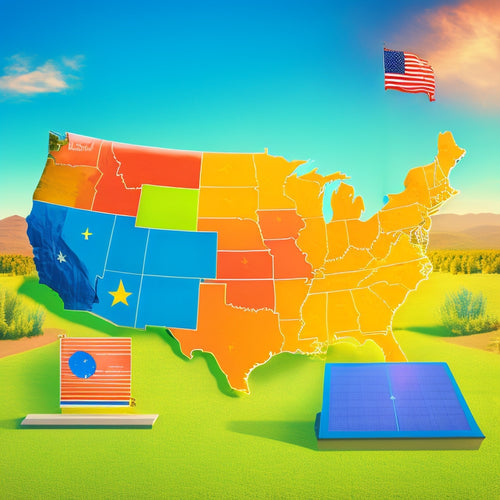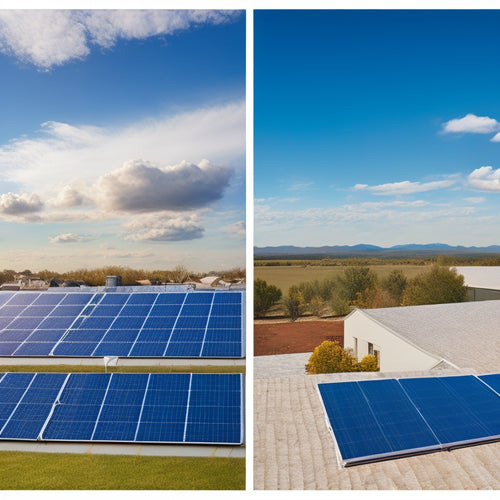
3 Solar Power Financing Options for Homes and Businesses
Share
You have three solar power financing options to evaluate: solar loans, power purchase agreements (PPAs), and solar leasing. Solar loans offer fixed interest rates, typically between 4% and 8%, and predictable monthly payments. PPAs provide no upfront costs, long-term stability, and financial incentives, while you buy generated electricity from a third-party provider. Solar leasing options allow you to rent panels, avoiding upfront costs, with fixed monthly payments and warranty coverage. Each option has its benefits and drawbacks, and understanding the details will help you make an informed decision about which one is right for your home or business - and there's more to investigate in each of these directions.
Key Takeaways
- Solar loans offer fixed interest rates, with credit score influencing the rate, and come in secured and unsecured options.
- Power Purchase Agreements (PPAs) provide no upfront costs, long-term contracts, and financial incentives like tax credits and rebates.
- Solar leasing options allow homeowners to rent solar panels with fixed monthly payments, warranty, and maintenance coverage.
- Solar financing options, including loans and PPAs, can provide budgeting predictability and potential savings on energy costs.
- Businesses and homeowners can choose from these financing options to adopt solar power and reduce their environmental footprint.
Solar Loans for Homeowners
Your roof is a beneficial asset, and utilizing its solar potential can greatly reduce your energy bills. One way to tap into this potential is by taking out a solar loan, specifically designed for homeowners like you. These loans allow you to finance your solar panel installation and pay it back over time, often with fixed interest rates and predictable monthly payments.
When considering a solar loan, your credit score plays a significant role in determining the interest rate you'll qualify for. Generally, borrowers with higher credit scores can secure lower interest rates, resulting in lower monthly payments.
Some solar loan providers offer competitive interest rates, ranging from 4% to 8%, depending on your creditworthiness.
Solar loans can be secured or unsecured, with secured loans often offering lower interest rates but requiring collateral, such as your home. Unsecured loans, on the other hand, don't require collateral but may come with higher interest rates.
Power Purchase Agreements
As you investigate financing options for your solar panel installation, you may find that a power purchase agreement (PPA) offers an attractive alternative to solar loans. With a PPA, a third-party provider installs and maintains the solar panel system on your property, and you agree to purchase the electricity generated at a fixed rate, often lower than your current utility rate.
This arrangement allows you to benefit from solar energy without shouldering the upfront costs.
The contract terms of a PPA typically range from 10 to 20 years, during which time you'll receive financial incentives such as tax credits and rebates. The provider handles maintenance, repairs, and monitoring, freeing you from these responsibilities.
You'll also benefit from the lock-in rate, which protects you from rising electricity costs. In exchange, the provider earns revenue from selling you the electricity and from any available incentives.
Solar Leasing Options
Frequently, homeowners seeking to take advantage of solar energy opt for solar leasing options, which offer an alternative to both solar loans and power purchase agreements. With solar leasing, you don't own the solar panels, but rather rent them from a third-party provider. This approach allows you to tap into solar energy without the upfront costs associated with purchasing the equipment.
Here's a summary of the benefits and drawbacks of solar leasing:
| Benefits | Drawbacks |
|---|---|
| No upfront costs | No ownership of the solar panels |
| Fixed monthly payments | Limited flexibility to customize the system |
| Warranty and maintenance coverage | Potential increase in monthly payments over time |
| No risk of depreciation | Potential difficulty selling your home |
| Opportunity to benefit from tax credits | Limited ability to claim tax credits |
When considering solar leasing, it's crucial to weigh the benefits against the drawbacks. While you'll avoid upfront costs, you won't own the equipment, and your monthly payments may increase over time. However, with warranty and maintenance coverage, you'll have peace of mind knowing that your system is well-maintained.
Frequently Asked Questions
What Is the Average ROI for Commercial Solar Installations?
You'll typically see an average ROI of 10-15% for commercial solar installations, factoring in commercial solar incentives and reduced solar installation costs, which can vary depending on system size, location, and local policies.
Can Solar Panels Increase My Property's Value?
As you gaze at your rooftop, envision an enhancement in your property's value; studies show that solar panels can increase it by up to 17%, according to a property appraisal, driven by market demand for eco-friendly homes.
Do Solar Panels Work During Power Outages?
You're wondering if solar panels work during power outages; unfortunately, they typically don't, as they're grid-tied for safety and efficiency reasons. However, with a battery backup system, you can achieve grid independence, ensuring your solar panel efficiency still powers your home during outages.
Can I Sell Excess Energy Back to the Grid?
You can sell excess energy back to the grid through net metering benefits, which measure your production and consumption, and energy buyback programs, allowing you to offset your bills and even earn credits, depending on your utility's policies.
Are Solar Panels Resistant to Extreme Weather Conditions?
You're as tough as nails, and you expect your solar panels to be just as resilient. Fortunately, they are! Solar panels boast impressive durability, withstanding extreme weather conditions like hailstorms and Category 4 hurricanes, ensuring consistent energy production.
Conclusion
You've got three solid solar power financing options to choose from: solar loans for homeowners, power purchase agreements, and solar leasing options. With the cost of solar panels dropping by 70% over the last decade, it's no wonder that 1 in 5 homes in California now have solar panels installed. As you weigh the pros and cons of each option, consider your budget, energy needs, and long-term goals to make an informed decision that's right for you.
Related Posts
-

Top 10 DIY Conversion Kit Reviews and Tips
You're taking the first step towards electrifying your ride, and with the right DIY conversion kit, you'll be cruisin...
-

3 Best State and Local Solar Incentives USA
You can greatly reduce your energy dependence and save thousands of dollars by taking advantage of the top state and ...
-

Tracking Solar Panels Vs Fixed Panels Cost Savings
When considering solar panel options, you'll want to weigh the cost savings of tracking solar panels versus fixed pan...


